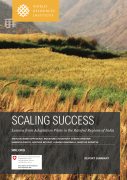Scaling Success
Lessons from Adaptation Pilots in the Rainfed Regions of India
by -This report helps policy makers, practitioners and funding agencies identify emerging adaptation good practices and the conditions necessary for scaling up those good practices to achieve adaptation success at scale.
Key Findings
Executive Summary
As climate change threatens India’s food security, adaptation in the agriculture sector is becoming increasingly important. However, for too long, adaptation has been characterized by individual efforts and by small, time-bound pilot projects. Although these projects often have a strong grassroots focus, their capacity to benefit larger populations and to contribute to policy reform is limited (Reid and Huq, 2014).
In India, scaling adaptation is of particular importance in rainfed agricultural areas, where crops depend on monsoon rains. Projections indicate that, without adaptation, climate change will stress rainfed agricultural systems, with potentially significant decreases in yield and a loss in farm-level net revenue of between 9 percent and 25 percent in the South Asia region (Manava and Robert, 2011).
This report aims to accelerate scaling of adaptation in rainfed India by providing a framework to enable project implementers, funding agencies, and policy makers to identify good adaptation practice, determine what is ready to be scaled, and understand the process of scaling and the conditions necessary to support it. The authors applied the framework to twenty-one adaptation projects and conducted four deep dive case studies to assess the scaling potential of adaptation projects in rainfed regions of India.


